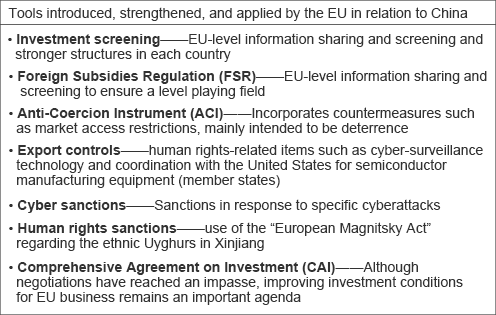| Author Name | TSURUOKA Michito (Keio University) |
|---|---|
| Research Project | Studies on Transformations of International Systems and their Impact on Japan's Mid- & Long-term Competitiveness |
| Download / Links |
This Non Technical Summary does not constitute part of the above-captioned Discussion Paper but has been prepared for the purpose of providing a bold outline of the paper, based on findings from the analysis for the paper and focusing primarily on their implications for policy. For details of the analysis, read the captioned Discussion Paper. Views expressed in this Non Technical Summary are solely those of the individual author(s), and do not necessarily represent the views of the Research Institute of Economy, Trade and Industry (RIETI).
The strategy of European Union (EU) toward China is undergoing a rapid and substantial transformation. While Japanese experts and officials have often criticized Europe of being too soft on China for many years, Europe is changing, albeit belatedly. What does the EU seek to achieve in its relations with China, particularly in the field of economic security?
Obviously, the EU’s most immediate policy goal is to safeguard its own economic interests. In addition to this, a more general policy goal can be described as protecting the “European way of life.” This also applies to its relationship with China. While it is only natural that the EU will seek to safeguard its own economic interests in a quantitative sense, underlying this aim is the fundamental attitude that Europe must remain European.
Since the middle of the 2010s, the EU has been introducing a series of measures to strengthen its investment screening and export controls and to counter state aid by foreign countries and economic coercion in recent years, amid a dramatic deterioration in China’s image in Europe. Brussels also pursued negotiations with China concerning the Comprehensive Agreement on Investment (CAI), although these negotiations eventually reached an impasse. While those measures, such as investment screening and export controls, are global in scope, there is no doubt that the EU’s practical focus is always on China. Behind these measures lies the problem of security, including economic security. Yet, the fact that the human rights concerns, particularly regarding the forced labor issues in Xinjiang province, are also playing an important part in Europe’s deliberations on China also needs to be highlighted. The overlap between economics, politics, and security is growing.

Japan has been emphasizing shared values such as freedom and democracy with the West, including the EU as a way to differentiate itself from China that does not share such values. With European perceptions of China deteriorating, the value of Japan as a partner for Europe is increasing. This is providing a tailwind that will benefit both Japan itself and the relationship between Tokyo and Brussels. Economic security is often highlighted as a priority area for Japan-EU cooperation in recent years. However, to develop this cooperation beyond just words and into a concrete framework promoting each partner’s key interests, the starting point must be a correct understanding of the EU’s China strategy.

